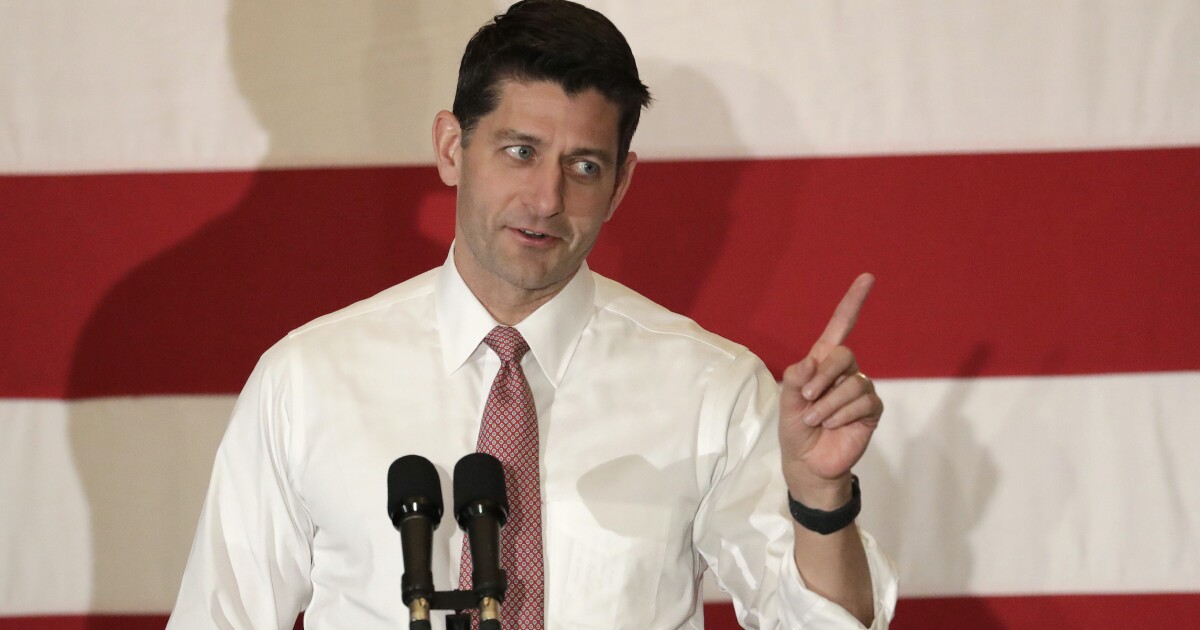

Paul Ryan has come full circle.
Before the former congressman was the speaker of the House of Representatives, before he was the Republican nominee for vice president, before he was chairman of the House Budget Committee, he was an unknown and lonely voice in the wilderness from Janesville, Wisconsin, pushing Washington to adopt wholesale reform of popular social safety net programs — entitlement programs — like Medicare, Medicaid, and Social Security.
Ryan, 52, is no longer an unknown political figure.
But he’s once again that lonely Republican voice pushing Congress and the White House to approve major legislation to put the three most popular social safety net programs in the United States on sustainable fiscal footing. And as he did all those years ago, Ryan is warning the bill for keeping these entitlements afloat will eventually come due in the form of a debt crisis with disastrous economic consequences for everyone.
Then as now, nobody is listening, least of all his own party.
Then as now, none of that seems to matter to Ryan. He sounds as optimistic in 2022 as he did as an audacious young backbencher, first elected to a two-decade House career in 1998, about the prospects that Republicans might embrace his call to rethink and modernize how federal programs for the elderly and the poor operate.
IOWA GOP DECLARES NEUTRALITY IN 2024 CAUCUSES
“The way I look at leadership is: Leaders move the polls. They don’t follow the polls. Leaders don’t just follow populism — they try to look at serious problems facing the country and offer solutions to it and then try to get people to understand and then agree with those solutions,” Ryan told the Washington Examiner during a recent interview.
“So, I think the politics of this can be changed so that if you’re not reforming these programs, then you’re complicit with the debt crisis that’s coming — you’re complicit with the insolvency of Medicare and Social Security, which is clearly coming,” Ryan added. “It’s quantifiable.”
Ryan has been making the media rounds to discuss American Renewal: A Conservative Plan to Strengthen the Social Contract & Save the Nation’s Finances, the new book he co-authored with colleagues at the American Enterprise Institute, a conservative think tank where he is a visiting fellow focused on public policy.
American Renewal touches on much more than Medicare, Medicaid, and Social Security. It examines government spending from top to bottom and devotes a great deal of energy to monetary policy and preserving the U.S. dollar as the world’s reserve currency. But it is proposals to alter popular entitlement programs that are sure to throw a political monkey wrench into any effort to take up the advice laid out in Ryan’s book.
A previous practitioner of electoral politics, Ryan acknowledges as much. Former President Donald Trump, when he was seeking the White House in 2016, vowed to abandon GOP efforts to overhaul social safety net programs popular with seniors, who are dependable voters, calling the policy bad politics that would cost Republicans votes. Republicans in the House and Senate have followed Trump’s lead ever since.
In this year’s midterm elections, whenever Democrats would accuse GOP candidates and incumbents of wanting to change how Medicare and Social Security operate, Republicans would aggressively push back, declaring they had zero plans to reform entitlements. Ryan, typically, is not discouraged, pointing to his own experience on Capitol Hill to prove reform is possible, even though he ultimately fell short of advancing legislation to a president’s desk.
For a time, Ryan managed to transform a third-rail political issue into legislation passed by a Republican-controlled House.
And as Ryan did so, his party repeatedly rewarded him. He was promoted to House Budget Committee chairman, House Ways and Means Committee chairman, vice presidential nominee, and House speaker. Ryan wasn’t even a member of House GOP leadership when he was tapped for the gavel — in large part because no other Republican could immediately command the support of a broad cross-section of the conference.
“I offered solutions like this and survived perfectly fine politically,” Ryan said.
These days, Ryan sports a busy resume.
He is the founder of the nonpartisan, not-for-profit American Idea Foundation, a public policy organization. Among Ryan’s several corporate gigs, he is chairman of the board of directors of Executive Network Partnering Corporation, partner at Solamere Capital, and vice chairman of Teneo. Ryan teaches at Notre Dame and serves on the boards of both the Ronald Reagan Presidential Foundation and the Center for Strategic and International Studies.
Amid all of this extrapolitical work, Ryan is still a large enough political figure that he is capable of fueling national headlines when he chooses to, as he did recently when asked to assess the state of the Republican Party vis-a-vis Trump.
Although the movement conservative from southeastern Wisconsin and the brash populist from New York City never really meshed personally or politically, they worked closely together when Ryan was speaker and Trump was president. The two Republicans collaborated on a $1.3 trillion overhaul of the federal tax code and other legislation, and Ryan said he appreciates all that they accomplished. But of course, there’s a “but.”
CLICK HERE TO READ MORE FROM THE WASHINGTON EXAMINER
“I was not a ‘Never Trumper.’ I’m grateful for the stuff we got done, and I’m grateful for the judges we have on the bench,” Ryan said. “But I’m a ‘Never Again Trumper’ because I want to win. And it’s really clear that swing voters in swing states don’t like Trump and won’t vote for him.”
Ryan is convinced Republican voters understand Trump is a liability in the general election after presiding over three consecutive disappointing elections for the GOP — in 2018, 2020, and 2022 — saying that whatever their personal affection for the former president, they are ready for a change.
“I believe the rank-and-file Republican voter is going to be so desperate to win in 2024 that they may love Trump, but they prefer winning,” he said. “We [already] know that with Trump, we are so much more likely to lose, and with anybody not named Trump, we are so much more likely to win. And I think that’s going to be palpable in 2024.”







